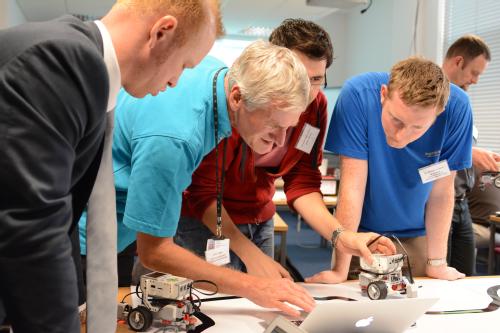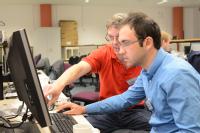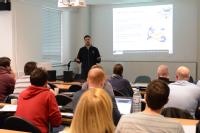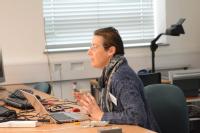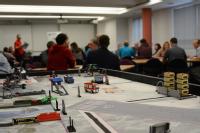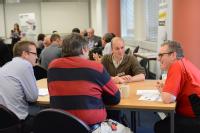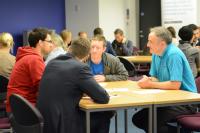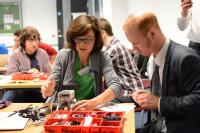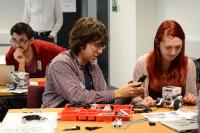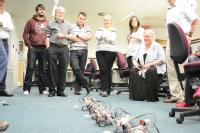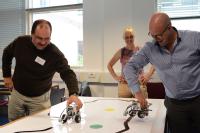Artificial Intelligence News
And now for something green ...

Research highlights the future of energy-aware high-performance computing
Leipzig, June 18, 2014. As reported in Inside HPC.
With energy costs a growing concern for High Performance Computing, Allinea Software will demonstrate its vision of a greener future with a preview of new tool extensions for application energy usage optimization at this year's International Supercomputing Conference (ISC'14) in Leipzig.
With larger numbers of data centers consuming over 1MW of power or having electricity bills topping $1M, energy is focussing the minds of the system sponsors and managers, says David Lecomber, CEO of Allinea Software.
Allinea Software worked with application performance experts at the University of Warwick to investigate novel energy and power measuring techniques for scientific application workloads.
to investigate novel energy and power measuring techniques for scientific application workloads.
Energy usage data is increasingly available at the system level, and our research also explored proxies for energy such as hardware counters to see where they could give deeper insight, said Professor Stephen Jarvis of University of Warwick’s HPC Performance Analysis Group.
The research supported the view that in many cases applications can reduce energy costs without adversely impacting actual run time.
Improving the green credentials of hardware and data centers is vital, and progress is good, but applications must also play their part. Energy optimization is a natural fit for our performance tools, adds Lecomber.
With the variety of workloads that HPC centers have, a ‘one size fits all’ strategy is a costly error – and so Allinea Performance Reports will provide information for application users and system managers to enable them to tune system and application parameters such as CPU frequency for optimal energy use for each application.
Our developer-centric tool, Allinea MAP, will allow scientific code developers to focus energy optimization down into the source code – making changes to the application to drive faster performance and lower energy consumption at the same time.
This research has been supported by the Technology Strategy Board's Emerging Technologies Energy Efficient Computing Programme.
DIMAP Algorithms Day 2014
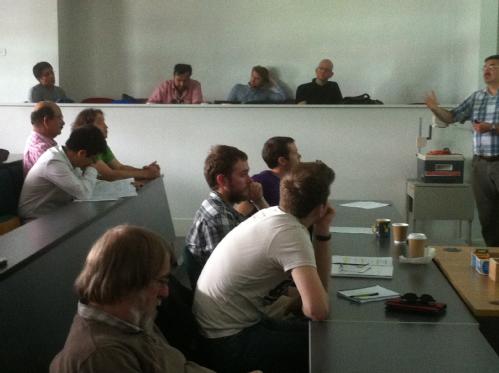
On May 21 2014, our Division of Theory and Foundations, jointly with DIMAP, organized DIMAP Algorithms Day 2014. The goal of the event was to bring together the UK community of researchers and graduate students interested in the study of Algorithms, Data Structures, and Complexity.
The event had an outstanding list of invited speakers from the leading academic institutions and research labs (Alexandr Andoni (Microsoft Research Silicon Valley), Graham Cormode (Warwick), Edith Elkind (Oxford), Leszek Gąsieniec (Liverpool), Aleksander Mądry (EPFL)) presenting the recent advances in Algorithms and its applications, and attracted over 60 participants from over the UK and from abroad.
Lego Engineering Conference
This week Warwick University Department of Computer Science hosted the first LEGO® Engineering Conference to feature the 3rd generation of its MINDSTORMS® robots. The event was designed to bring educators together to share experiences about how to get students engaged in computing, science, technology, engineering and maths.
Chris Rogers, Professor at Tufts University in Boston and Co-Director of the Center for Engineering Education and Outreach, is the founder of LEGO Engineering conferences. We were delighted that Chris could attend the event and give a keynote highlighting student innovation and creativity from schools around the world, reflecting on what made it possible. Chris also ran a hand-on workshop looking at applications of the data logging capabilities of the EV3.
Two other hands-on workshops also ran, one on Lego Robotics provided by John Pinkney from Warwickshire LA and one on Teaching Maths with Robots provided by Garry Redrup and Sue Johnston-Wilder.
The day also included presentations by the Institution of Engineering and Technology’s Schools Programme, which is responsible for managing FIRST® LEGO® League in the UK. Dr Nicky Hughes also talked about how RoboCupJnr contests are particularly good for getting girls engaged. Other talks covered LEGO® Therapy used for children in the autistic spectrum, and a presentation about Technocamps, an exciting project that provides free workshops to young people on programming, robotics, game design, app development and much more.
The conference received support from Computing At School, the IET Coventry And Warwickshire Network, LEGO® Education, and OCR.

